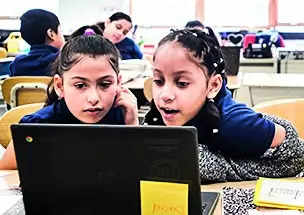On a recent morning, Cheryl Drakeford, a third grade teacher at First Avenue Elementary School in Newark, projected a challenging math question on her classroom’s whiteboard: “What fraction of the letters in the word ‘mathematician’ are consonants?” Drakeford knew that “consonant” might be an unfamiliar word to some students. So she suggested they ask Khanmigo, a new tutoring bot that uses artificial intelligence, for help. Then she asked the third graders to share the tutoring bot’s answer. “Consonants are the letters in the alphabet that are not vowels,” one student read. “The vowels are a, e, i, o and u. Consonants are all the other letters.”
Tech industry hype and doomsday prophesies around AIenhanced chatbots like ChatGPT sent many schools scrambling this year to block or limit the use of the tools in classrooms. Newark Public Schools is taking a different approach. It is one of the first school systems in the US to pilot testKhanmigo, an automated teaching aid developed by Khan Academy, an education nonprofit.
Newark has essentially volunteered to be a guinea pig for public schools across the country. Proponents contend that classroom chatbots could democratise the idea of tutoring by automatically customising responses to students, allowing them to work on lessons at their own pace. Critics warn that the bots, which are trained on vast databases of texts, can fabricate plausible-sounding misinformation — making them a risky bet for schools. Officials in Newark, the largest district in New Jersey, said they werecautiously testing the tutoring bot in three schools.
“It’s important to introduce our students to it, because it’s not going away,” Timothy Nellegar, the director of educational technology at Newark Public Schools, said. “But we need to figure out how it works, the risks, the good and the bad.”
Newark students began using the automated teaching aid in May. The reviews have so far been mixed. Tito Rodriguez, a statistics teacher,described the bot as a useful “co-teacher” thatallowed him to devote extra time to children who needed guidance. But in Drakeford’s math class, the bot’s responses sometimes seemed less like suggestions and more like direct answers. “That’s our biggest concern,” said Alan Usherenko, the district’s special assistant for schools. “We want them to know how to tackle the problem themselves, to use their critical thinking skills. ” Khan Academy said: “Our engineering team corrected the AI so that it no longer gives the answer.”
Tech industry hype and doomsday prophesies around AIenhanced chatbots like ChatGPT sent many schools scrambling this year to block or limit the use of the tools in classrooms. Newark Public Schools is taking a different approach. It is one of the first school systems in the US to pilot testKhanmigo, an automated teaching aid developed by Khan Academy, an education nonprofit.
Newark has essentially volunteered to be a guinea pig for public schools across the country. Proponents contend that classroom chatbots could democratise the idea of tutoring by automatically customising responses to students, allowing them to work on lessons at their own pace. Critics warn that the bots, which are trained on vast databases of texts, can fabricate plausible-sounding misinformation — making them a risky bet for schools. Officials in Newark, the largest district in New Jersey, said they werecautiously testing the tutoring bot in three schools.
“It’s important to introduce our students to it, because it’s not going away,” Timothy Nellegar, the director of educational technology at Newark Public Schools, said. “But we need to figure out how it works, the risks, the good and the bad.”
Newark students began using the automated teaching aid in May. The reviews have so far been mixed. Tito Rodriguez, a statistics teacher,described the bot as a useful “co-teacher” thatallowed him to devote extra time to children who needed guidance. But in Drakeford’s math class, the bot’s responses sometimes seemed less like suggestions and more like direct answers. “That’s our biggest concern,” said Alan Usherenko, the district’s special assistant for schools. “We want them to know how to tackle the problem themselves, to use their critical thinking skills. ” Khan Academy said: “Our engineering team corrected the AI so that it no longer gives the answer.”
